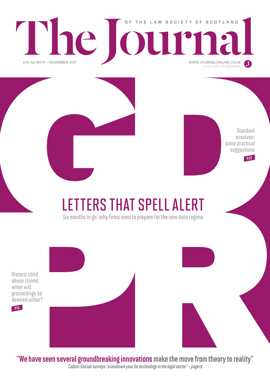Too hard a drive?

Once upon a time, Andrew Levinson was a partner in the accountancy firm Grant Thornton, responsible for introducing new technologies to professional firms. Engaging with lawyers, he confessed in an interview, could be a joyless task. In meeting after meeting he would extol the benefits of innovation and be warmly received. Then he would mention cost, and interest would evaporate faster than Harvey Weinstein’s reputation. “In my experience,” he observed ruefully, “about the only time lawyers become enthused about investing in expensive equipment is when it has BMW written on the front.”
Why is this? Is it just down to stinginess, as Levinson suggests, or lack of vision? Anything that results in a short-term hit to profits, or increases debt, is notoriously hard to push through. Perhaps, but I think there may be something more visceral going on. Technology is Janus-faced. It has brought countless benefits, but it has a dark side. Most of us have only a superficial understanding. Technology serves us, but we do not feel like its masters. Instead, many of us fear it may be driving us down a road to professional irrelevance.
It is progressing at a blistering pace. The clock in the Apple iPhone has more processing power than was available to NASA when it put the first men on the moon. As far back as 1997, IBM’s Deep Blue beat world chess champion Gary Kasparov, and in May this year, Google’s AlphaGo computer defeated Ke Ji, Grand Master of Go, the world’s most complicated board game. The Chinese Government’s reaction, blocking all live internet coverage of the contest, was as interesting as the result. “Anything that demonstrates that something special about China has turned out to be just another artificial intelligence problem that Google is better at solving than any other company is problematic,” said Clay Shirky, a professor at New York University Shanghai, “because it threatens the specialness of the culture.”
Mental leap
Do lawyers also see technology as a cultural threat? Does their failure to invest in it sufficiently, or use it better, reflect at least in part a subconscious desire to hold it at bay? My firm put technology at the heart of the business. We invested heavily in developing software used in the service of institutional clients looking for work which was process driven, that horrid word “commoditised”, and delivered at a price well below what had traditionally been the case. Not everything worked out as we planned, and sometimes we made mistakes. But over time we built a business of scale, and one of the most notable features of the journey was the contrast between clients’ enthusiasm and deep hostility from conservative elements in the profession. Our assault, as they saw it, on a bespoke, artisanal approach was more than just a competitive threat; it was an undermining of their craft and a desecration of their values.
The world has moved on. Lawyers openly hostile to technology are now rare. But as LexisNexis remarks, “a holding pattern has emerged, whereby many firms have identified the changes necessary to improve efficiency, working practices, and client satisfaction, but have not yet made the leap from words to action. They have acknowledged that changes need to be made, without actually making them”.
AI may decimate the ranks of lawyers, or its impact may be quite different. Regardless of what happens in the next decades, right now firms of all sizes have never had more opportunity to use technology to make themselves better businesses. Sometimes, large capital investments are needed, but just as often the solution lies in more intelligent use of what is already available. Few firms use their systems to their full potential.
The key is not so much an open wallet, as an open mind; a willingness to ask of every aspect of the business, “Why are we doing things this way? What needs to change?”, and not flinch from the answers, even when, as will sometimes be the case, benefits for the firm come at the cost of discomforting individuals.
There is one overriding reason for doing this: our clients are on the same journey. They expect their providers to be alongside. The most successful firms of today and tomorrow will be those not just keeping up, but bold enough to lead the way.
In this issue
- Immigration detention: a case of overuse
- Sexual harassment: don't suffer in silence
- Child disputes: a quicker way through?
- Brexit: where are we now and what happens next?
- Reading for pleasure
- Opinion: Claire McKee
- Book reviews
- Profile
- President's column
- ScotLIS: the citizens' tool
- People on the move
- People matter
- Historic abuse: the fairness matrix
- Landmark year in legal IT
- Sentence, but no full stop
- Opening up arbitration
- Making the agent pay
- Equal pay: beware the mass claims
- Dealing with conflict
- Claims outside the rules
- Pension transfers – history repeating itself?
- Last instructions
- Scottish Solicitors' Discipline Tribunal
- Standard missives: an unachievable dream?
- SOLAR powered
- Disability rights
- Law reform roundup
- Too hard a drive?
- Settlement: can you avoid cheques?
- Q & A corner
- When 25 is the new 35
- Sorry; not sorry
- Ask Ash
- Plan sets ambitious 2017-18 targets
- Letting agents: prepare to register
- Paralegal pointers
- A way to make an impact






